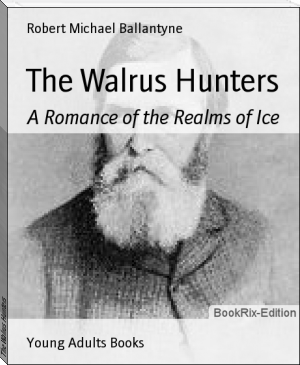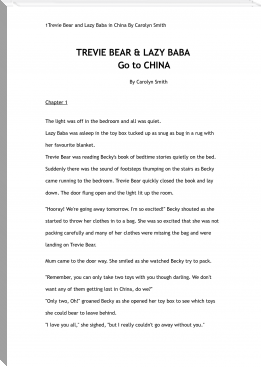The Walrus Hunters - Robert Michael Ballantyne (best book clubs .txt) 📗

- Author: Robert Michael Ballantyne
Book online «The Walrus Hunters - Robert Michael Ballantyne (best book clubs .txt) 📗». Author Robert Michael Ballantyne
Gartok was so taken aback with this behaviour of Oolalik, who was recognised as one of the gentlest and most peacefully disposed of the tribe, that he stood gaping for a moment in surprise. Then, observing the half-amused, half-contemptuous looks of the men around him, he suddenly caught up the unfinished handle of a spear that leaned against the wall of the hut beside him, and made a desperate blow with it at the head of Oolalik.
But that youth had expected some such demonstration, and was prepared for it. Being very agile, he made a step swiftly to one side, and the handle came down on the skull of a walrus which hung on the wall, with a violence that would have surprised its original owner had it been within.
Before the blow could be repeated Oolalik sprang towards his assailant.
Eskimos know nothing of a blow "straight from the shoulder," but they know how to cuff. Oolalik brought his open hand down on Gartok's cheek with a pistol-shot crack that tumbled that fire-eater head over heels on the ground.
The man was too strong, however, to be knocked insensible in that way. He recovered himself, sitting-wise, with his mouth agape and his eyes astonied, while the whole assembly burst into a hearty fit of laughter. High above the rest was heard the juvenile voice of the delighted Anteek.
What the fire-eater thought we cannot tell, but he had the wisdom to accept his punishment in silence, and listened with apparent interest while Oolalik concluded his remarks.
The effect of this belligerent episode was to advance the cause of the peace-party considerably--at least for a time--and when the meeting broke up, most of the people returned to their various homes with a firm determination to leave the poor Fire-spouters alone.
But Gartok, who was still smarting under the disgrace to which he had been subjected at the hands of Oolalik, managed to rekindle and blow up the war-spirit, so that, two days later, a strong party of the more pugnacious among the young men of the tribe set off in their kayaks for the Whale River, taking with them a few of the women in one of their open boats or oomiaks--chiefly for the purpose of keeping their garments in repair.
CHAPTER FOUR.
WAR PREVAILS.
It would seem, at times, as if there were really some sort of spiritual communication between people whose physical frames are widely sundered.
For at the very time that the Eskimos, in their remote home on the ice-encumbered sea, were informally debating the propriety of making an unprovoked attack on the Dogrib Indians--whom they facetiously styled Fire-spouters--the red men were also holding a very formal and solemn council of war as to the advisability of making an assault on those presumptuous Eskimos, or eaters-of-raw-flesh, who ventured to pay an uncalled-for visit to the Greygoose River--their ancestral property-- every spring.
One of their chiefs, named Nazinred, had just returned from a visit to the river, and reported having met and fought with one of the Eskimos.
Immediately on hearing this, the old or head chief summoned the council of war. The braves assembled in the council-tent in solemn dignity, each classically enveloped in his blanket or leathern robe, and inflated, more or less, with his own importance. They sat down silently round the council fire with as much gravity as if the fate of nations depended on their deliberations,--and so, on a small scale, it did.
After passing round the pipe--by way of brightening up their intellects--the old chief held forth his hand and began in a low voice and deliberate manner.
"My braves," said he, "those filthy eaters-of-raw-flesh have, as you know, been in the habit of coming to Greygoose River every spring and trespassing on the borders of our hunting-grounds."
He paused and looked round.
"Waugh!" exclaimed his audience, in order to satisfy him.
With a dark frown the old chief went on.
"This is wrong. It is not right. It is altogether unbearable, and more than the Dogribs can stand. They _won't_ stand it!"
"Waugh!" again said the audience, for the old man had delivered the last sentence with considerable vehemence, and meant that it should tell.
Being apparently destitute of a flow of ideas at that time, the speaker had recourse to a not uncommon device among civilised orators: he cleared his throat, looked preternaturally wise, and changed the subject.
"When the sun of spring rises over the ice-hills of the great salt lake," he continued, pointing towards the Pole, "when it melts the snow, opens the lakes and rivers, and brings the summer birds to our land, the braves of the great Dogrib nation take their guns, and bows, and canoes, and women, and travel nearly as far as the icy sea, that they may hunt and feed--and--sleep, and--and--enjoy the land. Nobody dares to stop us. Nobody dares to hinder us. Nobody dares even to look at us!"
He paused again, and this flight of oratory was received with a very decided "ho!" of assent, as it well might be, for during nearly all the year there was nobody in that uninhabited land to attempt any of those violent proceedings. Dilating his eyes and nostrils with a look of superlative wisdom, he continued:
"But at last the Eskimos dared to come and look at our hunting-grounds. We were peacefully disposed. We warned them not to come again. They came again, notwithstanding. We took our guns and swept them away like leaves that are swept by the winter winds. Are not their scalps drying in our lodges? What we did then we will do again. Has not one of our chiefs--Nazinred--been attacked by one of them? No doubt more will follow that one. My counsel is to send out a band of our braves on the war-path. But first we would like to know something. As the Eskimo did not take the scalp of Nazinred, how is it that Nazinred did not bring home the scalp of the Eskimo?"
The old chief ceased, amid many "ho's!" and "hoo's!" with the air of one who has propounded an unanswerable riddle, and all eyes were at once turned upon Nazinred. Accepting the challenge at once he stretched forth his hand:
"My father has spoken," he said, "but his words are not the words of wisdom. Why should we fight the Eskimos again, and lose some of our best young men, as we lost them in the last great fight? The Eskimos have come near our lands, but they have not of late hunted on them. They have only looked and gone away. And even if they did hunt, what then? The land is wide. We cannot use it all. We cannot kill all the birds and deer, and even if we could we cannot eat them all. Would it not be wise to live at peace with the Eskimos? They have many great teeth of the walrus and skins of the seal. Might not the white traders, who take our furs and give us guns and powder, be willing to take these things too? Thus we could buy from the one and sell to the other, and fill our lodges with tobacco, and guns, and beads, and cloth, and powder and ball, and other good things."
The Indian stopped at this point to ascertain the effect of his remarks, but only a few faint "ho's!" greeted him. The councillors did not feel quite sure of their own minds. His remarks about peace and war were not palatable, and his suggestions about trade were a novelty. Evidently Nazinred was born much in advance of his time.
"It is true," he continued, "that I had a struggle with a young Eskimo; but he was very strong, and so was I. Before I could kill him he caught hold of my gun, but he could not force it from me, and I could not force it from him. As we strove we looked into each other's eyes and we each saw peace and good-will there! So we ceased to fight. We kindled a fire and sat down and fed together. As the light slowly increases while the sun rises, so light came into my mind. The Dogribs have always talked of the Eskimos as if they were fools. I found that this young man was not a fool--that he was wise--wiser than some of our own braves. His mind was deep and wide. He did not talk only of food and sleep and hunting. He spoke of things past and present and future, and of the Great Spirit, and the world to come. Also of peace and war; and we both agreed that peace was good and war hateful. More than that, we found that it was foolish. Then we parted. He went, I suppose, to his people on the sea of ice, and I came home.
"He told me that none of his people were with him--that he was alone. There is therefore no occasion for the young men to look fierce or go on the war-path."
Having thus tried to throw oil on the troubled waters Nazinred came to an abrupt pause.
Instantly one of the younger councillors, named Magadar, sprang to his feet. He was unusually excitable for an Indian. Indeed, he differed a good deal from his companions in other respects, being passionate, impulsive, hasty, and matter-of-fact; in his speech-making too he scorned the use of symbol and metaphor, but went straight to the point at once in the simplest and most forcible language at his command.
"Braves," he said, looking at the previous speaker with a dark frown, "the Dogribs know nothing of those strange and stupid notions that have just come out of the lips of Nazinred. He says that this dirty Eskimo is a deep thinker and a man who loves peace. How does he know that one of that sort may not think so deeply as to deceive him? How does he know that the young man is not a liar--that many of his warriors may not be in our hunting-grounds even at this moment, though he says there are none? As for his talk about the Great Spirit and the future, what does he know about either the one or the other? Is he wiser than the Dogribs? Does his attack on Nazinred look like a lover of peace? His leaving off when he found that Nazinred was his match seems to me more like sly wisdom than the hatred of war. My advice is not to trust these dirty men of the ice, but to take our guns at once and drive them from the land."
It was quite evident from the way in which this speech was received that the war-party was in the ascendant, and there is no doubt that Magadar's advice would have prevailed, and a war-party been organised forthwith, but for the arrival of a band of successful hunters, who had been out for some time in quest of food.
For a considerable part of that winter those Indians had been in a condition of semi-starvation. They had managed with difficulty to sustain themselves





Comments (0)